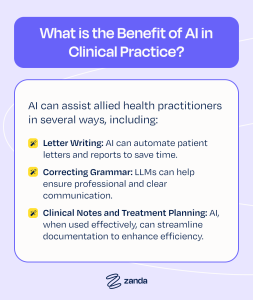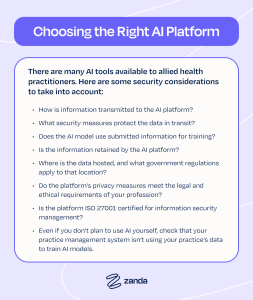Artificial intelligence (AI) has the power to transform allied health practice management with smarter tools for streamlining operations and enhancing patient care. From automating administrative tasks to providing data-driven insights, the right AI solution can improve efficiency and free up more time for meaningful patient interactions.
However, not all AI systems are the same.
Choosing the right AI platform to support your practice is crucial. It should align with your business’s unique needs, meet requirements for healthcare security and privacy, integrate seamlessly into your workflow, and make your job easier.
In this article, we’ll explore the key factors to consider when incorporating AI into your allied health practice, so you can make the best decision for your business and your patients.
What is the Benefit of AI in Clinical Practice?
Before selecting an AI platform, you need to understand your practice’s needs.
Large Language Model (LLM) platforms like ChatGPT, Gemini, Claude, and Copilot offer broad capabilities. AI tools built specifically for healthcare are powered by LLMs, but have usually been tailored for clinical workflows and applications.
AI can assist allied health practitioners in several ways, including:
- Letter Writing: AI can automate patient letters and reports to save time.
- Correcting Grammar: LLMs can help ensure professional and clear communication.
- Clinical Notes and Treatment Planning: AI, when used effectively, can streamline documentation to enhance efficiency.
A word of advice: First, assess the systems you already have in place.
Compatibility is key–any AI tools you use should integrate smoothly with your existing practice management software. The utility of ChatGPT in clinical practice (along with other LLMs) diminishes when you rely on copy-pasting between platforms, as it wastes time and increases the risk of errors.
Using a separate AI tool not specifically developed for healthcare also increases the risk of non-compliance with security and privacy regulations, and they may use the data you share for training. AI that’s directly integrated into practice management software should have additional safeguards in place that are specific to the health practice context that you operate within.
When selecting an AI solution, it’s important to consider one that works within your current setup to ensure seamless, effective implementation, without putting your patients’ security or privacy at risk.
Choosing the Right AI Platform
There are many AI tools available to allied health practitioners, but choosing the right one requires careful consideration.
Here are some key factors to evaluate:
Security Considerations
- How is information transmitted to the AI platform?
- What security measures protect the data in transit?
- Does the AI model use submitted information for training?
- Is the information retained by the AI platform?
- Where is the data hosted, and what government regulations apply to that location?
- Do the platform’s privacy measures meet the legal and ethical requirements of your profession?
- Is the platform ISO 27001 certified for information security management?
- Even if you don’t plan to use AI yourself, check that your practice management system isn’t using your practice’s data to train AI models.
Is the System Purpose-Built for Healthcare?
- Consider the sophistication of the AI model – can it perform the tasks you need?
- Are you using it for simple grammar correction, or do you need it to generate clinical notes and insights?
- A general-purpose AI tool may not be specialized enough to handle complex healthcare workflows.
Does It Have the Features You Need?
Evaluating the specific features of an AI platform is crucial to ensuring it meets your practice’s demands.
Key features may include:
- Transcription (Scribe): Automatically transcribes conversations, allowing practitioners to stay fully engaged with patients during treatment sessions.
- Clinical note writing: Converts transcribed sessions into structured clinical notes based on specific clinical note template formats.
- Follow-up letter-writing: Speeds up clinical communication with referring practitioners by generating clear, professional letters.
By considering these factors, you can ensure that your chosen AI platform enhances your practice without creating additional challenges.
AI Isn’t Magical
While AI can be a powerful tool, it isn’t infallible.
There’s nothing inherently “magical” about AI – it reflects the information and biases it’s been trained on. It’s important to remember that human mistakes, inconsistencies, and prejudices can still appear in AI-generated outputs.
For example, AI-enabled hiring tools have been shown to replicate biases found in past hiring decisions, leading to discriminatory outcomes. In this article, Forbes discusses the risks of bias in AI hiring tools, and here, Thomson Reuters highlights AI-enablement of anti-Black bias in recruiting.
AI should enhance–not replace–clinical judgment and ethical responsibility.
In allied health, this means that if you ask an AI model to analyze your past treatment plans and generate new ones, it will likely replicate any errors, oversights, or biases present in previous documentation. This underscores the importance of maintaining human oversight, judgment, and critical evaluation when integrating AI into your practice.
Clinical Experience Counts
AI in allied health can be a game-changer – but it’s no substitute for clinical expertise.
While senior practitioners may feel comfortable using AI to do the busy work for them, junior practitioners face a different challenge: Are they developing the hands-on skills they need, or are they leaning too heavily on artificial intelligence?
Think of it like driving. A seasoned driver can use cruise control wisely, but a learner who has only ever driven with Tesla’s Autopilot might struggle when they have to take full control. The same applies to using AI in a clinical practice.
Experienced practitioners have the knowledge to critically assess AI-generated insights, ensuring that patient records remain accurate and meaningful. But newer practitioners, especially those entering hospital environments where AI tools are becoming standard, risk de-skilling if they rely too much on AI.
That’s why human oversight is essential.
AI should assist, not replace, clinical decision-making. Ensuring that every entry in a clinical record is reviewed and approved by a practitioner isn’t just best practice–it’s essential for patient safety and professional growth.
AI as an Assistant
Concerns about over-reliance on AI are valid, but there’s also an undeniable upside: AI can help us see what we might otherwise miss, and become exponentially more productive. As we all adapt to a world with AI, the smartest among us will recognize that using AI to our benefit, in ways that won’t compromise our quality, security, or privacy standards, is an essential skillset to master.
After all, human focus and processing power is limited – we can only track so many details at once. AI, on the other hand, can analyze vast amounts of information instantly and detect patterns and anomalies that might escape even the most experienced practitioner.
Think of AI as an extra set of eyes.
It can flag inconsistencies in patient records, highlight potential risks, and provide data-driven insights that support clinical decision-making. This frees up valuable time, allowing practitioners to focus on what’s important–the aspects of care that require human intuition, empathy, and expertise.
At its best, AI is an assistant, not an authority. It enhances our work, but it’s the human element that brings adaptability, creativity, and emotional intelligence. The key is striking the right balance.
Introducing BizzyAI
At Zanda, we’re always looking for ways to make practice management more efficient without compromising the quality of care. That’s why we’re excited to introduce BizzyAI: Scribe and BizzyAI: Refine – powerful tools designed specifically for allied health practitioners.
Developed by a psychologist who understands the real-world demands of clinical work and the distractions of admin work, BizzyAI is designed to save time and importantly, save mental energy for work with patients. The first two parts of our AI feature set include BizzyAI: Scribe and BizzyAI: Refine, and these will soon be followed by BizzyAI: Insights.
BizzyAI: Scribe streamlines note-taking by transcribing live sessions or dictated notes in real time and generating clinical notes using the template of your choice, while BizzyAI: Refine makes the writing experience easier for creating professional emails, letters, practice procedures, clinical notes, and more.
Designed with Healthcare in Mind:
Like all Zanda features, BizzyAI is developed to meet the strictest privacy and security standards worldwide. Importantly, no audio recordings are stored, and transcriptions are made securely and are deleted according to your timing preferences.
Security & Compliance You Can Trust
BizzyAI runs on Anthropic’s AI model, hosted within the Amazon Web Services (AWS) environment – the same trusted cloud infrastructure used by most global banks, healthcare providers, and governments, ensuring top-tier encryption, compliance with industry-leading security standards, and 99.99% uptime. Because it’s contained within AWS, no data is sent back to Anthropic, keeping all information protected under the same strict security protocols as the Zanda core platform.
With ISO 27001 certification and full HIPAA and GDPR compliance, you can trust that your practice’s data remains safe, secure, and in line with global healthcare standards.
The Future of AI in Allied Health Starts with the Right Tools
AI can transform allied health practices (and your bottom line), but only if it’s implemented thoughtfully. It’s not about simply using ChatGPT for healthcare applications, but ensuring that your clinical and security needs are met while benefiting from the strengths of AI. The best AI solutions enhance your workflow while keeping your data protected and your clinical judgment front and center.
With BizzyAI: Scribe and BizzyAI: Refine, you get secure, purpose-built AI tools designed specifically for allied health practitioners. It’s built to save time, improve efficiency, and support high-quality patient care–without compromising compliance or control.
Ready to experience Zanda? Start your free trial now and get more out of your day.







